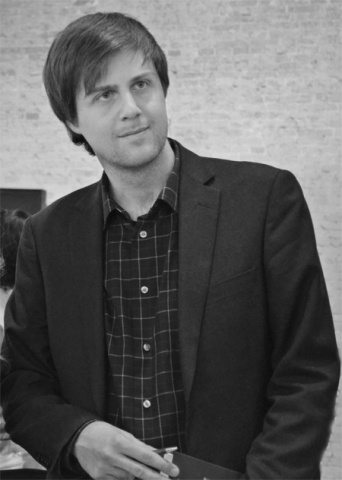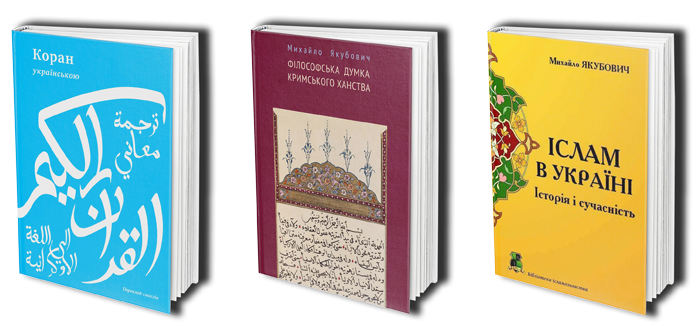Mykhailo Yakubovych is known as translator of Quran into Ukrainian language, as well as the author of "Philosophical thought of the Crimean Khanate" and "Islam in Ukraine. History and Modern Times ", which has been released in the scientific digest "Al-Qalam". He is orientalist, researcher of the doctrinal and philosophical thoughts of the Islamic world, as well as the lecturer at the National University "Ostroh Academy", who involves his students in Islamic Studies.
The Information resource “Chytomo” published interview with Mykhailo Yakubovych. Journalist Nata Koval decided to ask the specialist in Islamic studies, how he worked on translations, whom from the Crimean Tatar thinkers we should know, and how the scholar cooperates with publishers.
You are the head of the Centre for Islamic Studies of the National University "Ostroh Academy" (hereinafter — NUOA). What goals have you already achieved?
— Centre for Islamic Studies under NUOA was founded relatively new, in November last year. Now we are getting the contacts with various educational and research institutions. For example, we are going to hold School For Islamic Studies at Ostroh Academy together with Ukrainian Centre for Islamic studies in July. Recently we had guests from Istanbul Foundation for Science and Culture (Turkey).
Apart from me, there are two employees at the centre — my postgraduate student Liana Vinichuk that studies Turkish spiritual culture, and PhD Vytalii Shchepanskyi, already well-known scientist, a scholar of early modern traditions of the Eastern and Western mysticisms.
How long have you been working on material for the book "Islam in Ukraine"?
— In total — for several years. There are topics that require "to be involved" in it constantly (associated with modern times), to contact with representatives of Islamic organisations, other experts and researchers. But, for example, the issue on the Muslim population of Volyn I studied on-site, as it required to work in specific areas, and to study the manuscripts.
The several parts, about the history of Islam from the medieval period up to the present, will interest everyone who is not indifferent to this topic. First of all, they are students and researchers. The feature of the book is that it is a preliminary draft. In the future, the gathered information needs bigger book, or even several volumes. One theme on the Ottoman presence in Ukraine requires a fundamental work.
Are you the only researcher of philosophical component in the Crimean Tatar prose? Were there any prior studies in that field?
— In truth, I was not the first and not the only one, who studies this issue. In this context some of the Crimean-Tatar colleagues, in particular, Alie Kangieva, Nariman Seytyagyaeva, Turkish scientists should be mentioned. My work is characterized by the fact that I have explored neither historical, nor literary features of the religious culture of the south Ukrainian Muslims. But I studied the philosophical tradition according to its Muslim understanding. Now it is called the "intellectual history".
Studying the development of Islamic religious and philosophical thought in Ukraine during the Golden Horde and the Crimean Khanate, you managed to handle several dozen manuscripts created by the Crimean authors in the libraries of many countries. You said that some of them have never been studied. It means, it hadn’t been studied by the Ukrainian researchers, or by anyone at all?
- Yes, I worked in the libraries of Saudi Arabia, Turkey, and the United States. The fact is that for various reasons the Crimean authors found themselves outside their homeland. Many works had been written in Istanbul and they were kept in local libraries. Subsequently, some of them got in private collections in the West. I mean only manuscripts, which are scattered throughout the libraries of many countries nowadays. These are remained originals as well as later copies.
Some of the texts haven’t been really studied (for example, the fundamental work of the Crimean mystic Ibrahim al-Qırım "The Gifts of the Most Merciful "), or it was studied in other contexts, without specific attention to the "Crimean tradition".
Why are Crimean Tatar thinkers significant for the Muslim and world philosophies?
- Specific feature was encyclopedic knowledge of Crimean authors, the breadth of their knowledge, their desire to work with primary sources, a critical attitude to the already well-established interpretations. In general, this is what distinguishes the Ukrainian Islam even today (in spite of the tragedy of deportation and others) and it is a tolerance and respect for other opinions.
Please, name the Crimean Tatar thinkers, whom we should know.
— I think, it is especially Abu Bakr Qalandar, Persian speaking author of the book “Qalandar-name”, written in XIV century. Ahmad al-Qrimi (XV century) has managed to combine the classic mysticism and theology in his works. Already mentioned Ibrahim al-Qırım (XVI c.) is the creator of a particular philosophy, also, of course, Abu al-Baqa al-Kafauvi (XVII century.) is the author of a philosophical dictionary "The book of general concepts", which contains more than 3,000 terms and is still popular in the Islamic world. It should be mentioned Mohammad al-Akkirmani (XVIII c.), the author of over 60 publications in the field of theology, Islamic law and logic, a native of Bilhorod-Dnistrovskyi. The latter had probably Ukrainian roots.
Did you hope for such success of the Ukrainian translation of Quran? What does it mean?
— If we are talking about my translation of Quranic meanings, to be honest, I'm waiting for new translations by other researchers, or religious leaders. The more translations we have the better it is. Although I have already seen references to my translation in various scientific articles (as well as art editions), and that, of course, is quite pleasant. The audio version is already prepared, and soon a new edition will come out in Ukraine and two editions — in Turkey (with the assistance of the Turkish Ministry of Religion).
The book "Philosophical thought of the Crimean Khanate" is the study on Islamic philosophy in post-classical period on the territory of Ukraine. What are the significant features of the Muslim philosophy of postclassic period?
- This period includes XIV — XVIII centuries. Previously, orientalists viewed that period as a kind of "dark ages" of Islam during which nothing fundamentally new appeared. Modern researches suggest other point of view. This is a time when the Muslim intellectual culture paid particular attention to the theory of the interpretation (in this context the Muslim scholars were even ahead of the European postmodernists), developed mysticism and theological tradition, where reigned the spirit of rationalism and respect to logic. At the same time the reformers came and tried to restore the "primary Islam".
Is it hard to find the publisher? What does the author have to offer?
- There are a very few publishers of scientific literature that are willing to invest in printing. Most monographs, unfortunately, are printed at the expense of the authors or sponsors. This is not so, as it should be. It is also the market, and here a buyer is required. But who will be that buyer? In the United States, a student or doctoral candidate can pay about 50 dollars (or more) for scientific novelty. But how much is our student ready to pay for the book? Especially, when it is talked of those students, who used to prepare essays, term papers or graduate works, partly or completely downloaded from the Internet and the teachers dissembled that fact. And a lecturer with a salary of a few thousand hryvnas is hardly ready to invest thousand per month into the book. There are, of course, fans, book lovers (the market grounds on them). But in general, the situation leaves much to be desired. Therefore, the scientist must be talented, patient and persistent in order to find a sponsor.
What is the reason that the number of works and books about Crimean Tatars in Ukraine has increased? Are there a lot of blank spots?
- Paradoxically, it is the loss of the Crimea. I do not want to say that it is too late, or all is not lost, but it is an unfortunate reality. The blank spots are not only a lot, but there is almost solid blank spot. Try to find at least some kind of a textbook on the history of Ukraine for the school or the university, in which the culture of the Crimean Khanate is mentioned even indirectly (and not only conflicting imperial and Soviet-style narrations about the "Tatar attacks "). Much remains to be done.
Translation into English by "slam in Ukraine"




